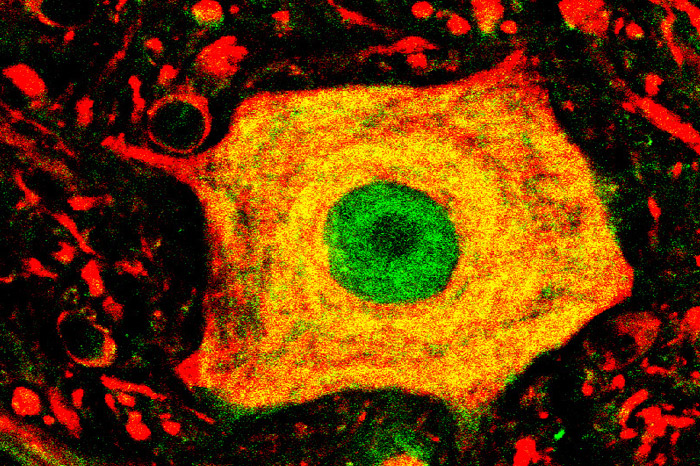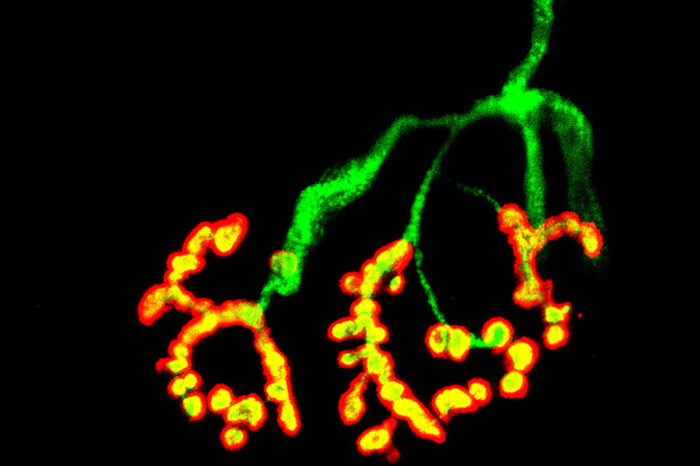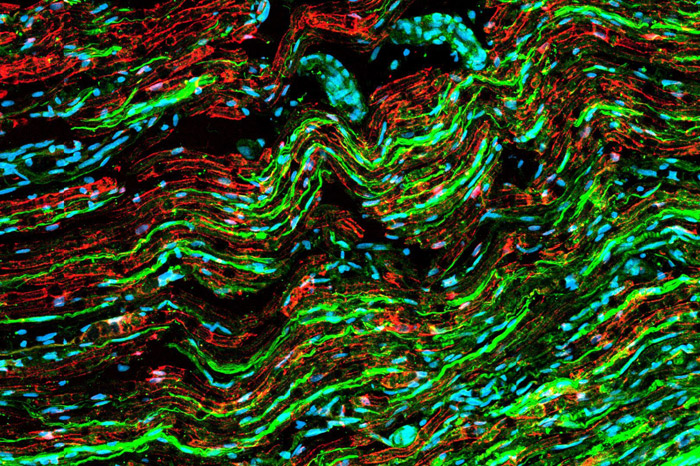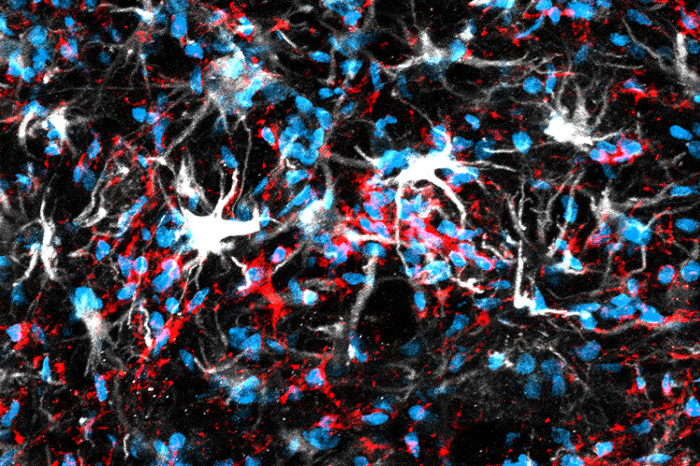Neurodegeneration
In most neurodegenerative diseases such as Alzheimer, Parkinson and Amyotrophic Lateral Sclerosis (ALS), neuronal pathology begins as a focal process that extends to other regions of the nervous system.
Our research aims to understand the biological mechanisms underlying the neurodegenerative process in ALS. Likewise, our research points to the development of new drugs that could stop or slow disease progression, which would allow a significant improvement in patient’s quality of life.
The experimental approach is based on characterizing the neurodegenerative “cellular microenvironment”, unravelling the role of neurons and glial cells as well as immune and vascular cells. We have recently identified new cell types with aberrant phenotype as well as new protein mediators and receptors that promote the degenerative process and that can be targeted by specific drugs.
The results of these studies will impact on a better understanding, diagnosis and treatment of neurodegenerative diseases.
Members







Research lines
Characterization of aberrant phenotypes of glial cells during ALS.
Influence of mast cells and neutrophils on the degeneration of motor neurons and loss of neuromuscular synapses.
Development of new neuroinflammatory modulators for the treatment of ALS.
Nitro-NGF as a new glial factor that mediates the apoptosis of the motor neuron.
Projects
2016-2017 – Research contracts for drug development for ASL (Megapharma, Uruguay and AbScience, France).
2015-2017 – ECOS Project U014S02 “Mastocytes and neuroinflammation in neurodegenerative diseases: characterization of the mechanisms involved and new therapeutic targets”.
2013-2014 – Clemente Estable Fund-ANII. FCE_1_2011_1_7342. “Phenotypically Aberrant astrocytes (AbA cells): identification of mechanisms and neurotoxic genes”. Amount granted aprox. US$ 40,000.
Main publications
vacio
2018
- Olivera-Bravo S, Seminotti B, Isasi E, Ribeiro CA, Leipnitz G, Woontner M, Goodman SI, Souza D, Barbeito L, Wajner M. Long Lasting High Lysine Diet Aggravates White Matter Injury in Glutaryl-CoA Dehydrogenase Deficient (Gcdh-/-) Mice. Mol Neurobiol. 2018
- Kim MJ, Vargas MR, Harlan BA, Killoy KM, Ball LE, Comte-Walters S, Gooz M, Yamamoto Y, Beckman JS, Barbeito L, Pehar M. Nitration and Glycation Turn Mature NGF into a Toxic Factor for Motor Neurons: A Role for p75(NTR) and RAGE Signaling in ALS. Antioxid Redox Signal. 2018, 28(18):1587-1602.
2017
- Trias E., Ibarburu S., Barreto-Nuñez R., Varela V., Moura I.C., Dubreuil P., Hermine O., Beckman S.J., Barbeito L.. Evidence for mast cells contributing to neuromuscular pathology in an inherited model of ALS. Journal of Clinical Investigation-Insight. 20172(20):e95934
- Ibarburu S, Trias E., Lago N, Barreto-Nuñez R, Varela V, Beckman SJ, Barbeito L. 2017. Focal Transplantation of Aberrant Glial Cells Carrying the SOD1G93A Mutation into Rat Spinal Cord Induces Extensive Gliosis. Neuroimmunomodulation. 24(3):143-153
- Trias E., Ibarburu S., Barreto-Núñez R., Barbeito L. 2017. Significance of aberrant glial cell phenotypes in pathophysiology of amyotrophic lateral sclerosis. Neuroscience Letters. 636:27-31. Review.
- Jiménez-Riani M., Díaz-Amarilla P., Isasi E., Casanova G., Barbeito L., Olivera-Bravo S. 2017. Ultrastructural features of aberrant glial cells isolated from the spinal cord of paralytic rats expressing the amyotrophic lateral sclerosis-linked SOD1G93A mutation. Cell and Tissue Research. 1(11)
2016
- Williams, J.R., Trias, E., Beilby, P.R., Lopez, N.I., Labut, E.M., Bradford, C.S., Roberts, B.R., McAllum, E.J., Crouch, P.J., Rhoads, T.W., et al. 2016. Copper delivery to the CNS by CuATSM effectively treats motor neuron disease in SOD mice co-expressing the Copper-Chaperone-for-SOD. Neurobiol Dis 89:1-9.
- Trias, E., et al., Post-paralysis tyrosine kinase inhibition with masitinib abrogates neuroinflammation and slows disease progression in inherited amyotrophic lateral sclerosis. J Neuroinflammation, 2016. 13(1): p. 177.
- Diaz-Amarilla P, Miquel E, Trostchansky A, Trias E, Ferreira AM, Freeman BA, Cassina P, Barbeito L, Vargas MR, Rubbo H. Electrophilic nitro-fatty acids prevent astrocyte-mediated toxicity to motor neurons in a cell model of familial amyotrophic lateral sclerosis via nuclear factor erythroid 2-related factor activation. Free Radic Biol Med. 2016 95:112-20.
- Villarreal A, Rosciszewski G, Murta V, Cadena V, Usach V, Dodes-Traian MM, Setton-Avruj P, Barbeito LH, Ramos AJ. Isolation and Characterization of Ischemia-Derived Astrocytes (IDAs) with Ability to Transactivate Quiescent Astrocytes. Front Cell Neurosci. 2016; 10:139.
2015
- Olivera-Bravo S, Ribeiro CA, Isasi E, Trías E, Leipnitz G, Díaz-Amarilla P, Woontner M, Beck C, Goodman SI, Souza D, Wajner M, Barbeito L. Striatal neuronal death mediated by astrocytes from the Gcdh-/- mouse model of glutaric acidemia type I. Hum Mol Genet. 2015; 24(16):4504-15.
- Olivera-Bravo, S., and Barbeito, L. A role of astrocytes in mediating postnatal neurodegeneration in Glutaric acidemia-type 1. FEBS Lett 2015, 589:3492-3497.
2014
- Miquel E, Cassina A, Martínez-Palma L, Souza JM, Bolatto C, Rodríguez-Bottero S, Logan A, Smith RA, Murphy MP, Barbeito L, Radi R, Cassina P. Neuroprotective effects of the mitochondria-targeted antioxidant MitoQ in a model of inherited amyotrophic lateral sclerosis. Free Radic Biol Med. 2014, 70:204-13.
- Richter M, Varela V, Trias E, Barbeito L. (2014). “Post-translational modification of nerve growth factor by peroxynitrite: pathogenic significance in neurodegenerative diseases”. European Journal of neurodegenerative diseases, 2014 Dec; Vol 3.
- Olivera-Bravo S, Isasi E, Fernández A, Rosillo JC, Jiménez M, Casanova G, Sarlabós MN, Barbeito L. White matter injury induced by perinatal exposure to glutaric acid. Neurotox Res. 2014, 25(4):381-91.
2013
- Trias E, Díaz-Amarilla P, Olivera-Bravo S, Isasi E, Drechsel DA, Lopez N, Bradford CS, Ireton KE, Beckman JS, Barbeito L. Phenotypic transition of microglia into astrocyte-like cells associated with disease onset in a model of inherited ALS. Front Cell Neurosci. 2013; 7:274.
- Gandelman M, Levy M, Cassina P, Barbeito L, Beckman JS. P2X7 receptor-induced death of motor neurons by a peroxynitrite/FAS-dependent pathway. J Neurochem. 2013, 126:382-8.
- Seminotti B, Amaral AU, da Rosa MS, Fernandes CG, Leipnitz G, Olivera-Bravo S, Barbeito L, Ribeiro CA, de Souza DO, Woontner M, Goodman SI, Koeller DM, Wajner M. Disruption of brain redox homeostasis in glutaryl-CoA dehydrogenase deficient mice treated with high dietary lysine supplementation. Mol Genet Metab. 2013, 108(1):30-9.
2012
- Miquel E, Cassina A, Martínez-Palma L, Bolatto C, Trías E, Gandelman M, Radi R, Barbeito L, Cassina P. Modulation of astrocytic mitochondrial function by dichloroacetate improves survival and motor performance in inherited amyotrophic lateral sclerosis. PLoS One. 2012; 7(4):e34776.
- Drechsel DA, Estévez AG, Barbeito L, Beckman JS. Nitric oxide-mediated oxidative damage and the progressive demise of motor neurons in ALS. Neurotox Res. 2012 Nov; 22(4):251-64.
2011
- Díaz-Amarilla P, Olivera-Bravo S, Trias E, Cragnolini A, Martínez-Palma L, Cassina P, Beckman J, Barbeito L. Phenotypically aberrant astrocytes that promote motoneuron damage in a model of inherited amyotrophic lateral sclerosis. Proc Natl Acad Sci U S A. 2011; 108(44):18126-31.
- Olivera-Bravo S, Fernández A, Sarlabós MN, Rosillo JC, Casanova G, Jiménez M, Barbeito L. Neonatal astrocyte damage is sufficient to trigger progressive striatal degeneration in a rat model of glutaric acidemia-I. PLoS One. 2011; 6(6):e20831.
2010
- Garré JM, Retamal MA, Cassina P, Barbeito L, Bukauskas FF, Sáez JC, Bennett MV, Abudara V. FGF-1 induces ATP release from spinal astrocytes in culture and opens pannexin and connexin hemichannels. Proc Natl Acad Sci U S A. 2010, 107(52):22659-64.
- Gandelman M, Peluffo H, Beckman JS, Cassina P, Barbeito L. Extracellular ATP and the P2X7 receptor in astrocyte-mediated motor neuron death: implications for amyotrophic lateral sclerosis. J Neuroinflammation. 2010 Jun 9; 7:33.
- Barbeito AG, Martinez-Palma L, Vargas MR, Pehar M, Mañay N, Beckman JS, Barbeito L, Cassina P. Lead exposure stimulates VEGF expression in the spinal cord and extends survival in a mouse model of ALS. Neurobiol Dis. 2010; 37(3):574-80.






